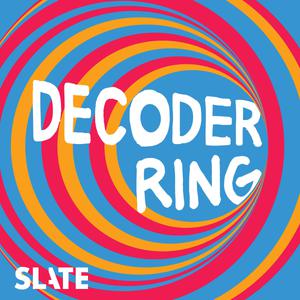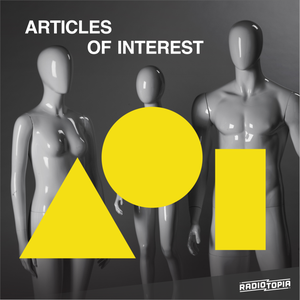
Decoder Ring
Slate Podcasts
Cracking cultural mysteries
- 41 minutes 45 secondsMaking Real Music for a Fake Band
Pop culture is full of fictional bands singing songs purpose-made to capture a moment, a sound. This music doesn’t organically emerge from a scene or genre, hoping to find an audience. Instead it fulfills an assignment: it needs to be 1960s folk music, 1970s guitar rock, 80s hair metal, 90s gangsta rap, and on and on.
In this episode, we’re going to use ‘Stereophonic,’ which just opened on Broadway, as a kind of case study in how to construct songs like this. The playwright David Adjmi and his collaborator, Will Butler formerly of the band Arcade Fire, will walk us through how they did it. How they made music that needs to capture the past, but wants to speak to the present; that has to work dramatically but hopes to stand on its own; that must be plausible, but aspires to be something even more.
The band in Stereophonic includes Sarah Pidgeon, Tom Pecinka, Juliana Canfield, Will Brill, and Chris Stack. Stereophonic is now playing on Broadway—and the cast album will be out May 10.
Thank you to Daniel Aukin, Marie Bshara, and Blake Zidell and Nate Sloan.
This episode was produced by Max Freedman and edited by Evan Chung, who produce the show with Katie Shepherd. Derek John is Executive Producer. Merritt Jacob is Senior Technical Director.
If you haven’t yet, please subscribe and rate our feed in Apple Podcasts or wherever you get your podcasts. And even better, tell your friends.
If you’re a fan of the show, please sign up for Slate Plus. Members get to listen to Decoder Ring and all other Slate podcasts without any ads and have total access to Slate’s website. Your support is also crucial to our work. Go to Slate.com/decoderplus to join Slate Plus today.
Learn more about your ad choices. Visit megaphone.fm/adchoices
24 April 2024, 7:00 am - 37 minutes 5 secondsCan the “Bookazine” Save Magazines?
Magazines have fallen on hard times – especially the weekly news, fashion, and celebrity mags that once dominated newsstands. The revenue from magazine racks has plummeted in recent years, and many magazines have stopped appearing in print or shut down altogether.
And yet, there is something growing in the checkout aisle: one-off publications, each devoted to a single topic, known as “bookazines.” Last year, over 1,200 different bookazines went on sale across the country. They cover topics ranging from Taylor Swift, Star Wars, the Kennedy assassination, K-Pop, the British royal family, and as host Willa Paskin recently observed, the career of retired movie star Robert Redford.
In today’s episode, Willa looks behind the racks to investigate this new-ish format. Who is writing, publishing, and reading all these one-off magazines – and why? Is the bookazine a way forward for magazines, or their last gasp?
Voices you’ll hear in this episode include Caragh Donley, longtime magazine journalist turned prolific writer of bookazines; Eric Szegda, executive at bookazine publisher a360 media; and Erik Radvon, comic book creator and bookazine fan.
This episode was produced by Max Freedman and edited by Evan Chung, who produce the show with Katie Shepherd. Derek John is Executive Producer. Merritt Jacob is Senior Technical Director.
If you haven’t yet, please subscribe and rate our feed in Apple Podcasts or wherever you get your podcasts. And even better, tell your friends.
If you’re a fan of the show, please sign up for Slate Plus. Members get to listen to Decoder Ring and all other Slate podcasts without any ads and have total access to Slate’s website. Your support is also crucial to our work. Go to Slate.com/decoderplus to join Slate Plus today.
Learn more about your ad choices. Visit megaphone.fm/adchoices
10 April 2024, 7:00 am - 54 minutes 16 secondsAndrew Wyeth's Secret Nudes (Encore)
In 1986, Andrew Wyeth was the most famous painter in America. He was a household name, on the cover of magazines and tapped to paint presidents. And then he revealed a secret cache of 240 pieces of artwork, many provocative, all featuring the same nude female model. This collection, called The Helga Pictures, had been completed over 15 years and hidden from his wife, until they were revealed and wound up on the covers of both Time Magazine and Newsweek. The implication of these paintings were clear: Wyeth must have been having an affair, but then the story got complicated. Was it a genuine sex scandal? A hoax? Or something else entirely?
Some of the voices you’ll hear in this episode include Doug McGill, former New York Times reporter; Neil Harris, author of Capital Culture: J. Carter Brown, the National Gallery of Art, and the Reinvention of the Museum Experience; Cathy Booth Thomas, former Time Magazine correspondent; Gwendolyn Dubois Shaw, art historian and curator; Jeannie McDowell, former Time Magazine correspondent; Chris Lione, former art director at Art and Antiques; Joyce Stoner, Wyeth scholar; Peter Ralston, Wyeth photographer and friend; and Jim Duff, former director of the Brandywine River Museum.
This episode was written by Willa Paskin and produced by Willa Paskin and Benjamin Frisch. It was edited by Benjamin Frisch and Gabriel Roth. We had research assistance from Cleo Levin. Decoder Ring is produced by Evan Chung, Katie Shepherd, and Max Freedman. Derek John is Executive Producer. Merritt Jacob is Senior Technical Director.
A very special thank you to Paula Scaire.
If you haven’t yet, please subscribe and rate our feed in Apple Podcasts or wherever you get your podcasts. And even better, tell your friends.
If you’re a fan of the show, please sign up for Slate Plus. Members get to listen to Decoder Ring and all other Slate podcasts without any ads and have total access to Slate’s website. Your support is also crucial to our work. Go to Slate.com/decoderplus to join Slate Plus today.
Learn more about your ad choices. Visit megaphone.fm/adchoices
27 March 2024, 7:00 am - 42 minutes 54 secondsWhy Stylists Rule the Red Carpet
Like a manager or an agent or a publicist, a stylist has become a kind of must-have accessory for well-dressed, A-list celebrities. It’s just expected that they will have hired someone to select the clothes they’ll wear at public appearances. But this was not always the case.
In today’s episode, Avery Trufelman, host of Articles of Interest, will guide us through the collapse of a certain kind of Hollywood glamor; to the rise of a growing, financially rewarding relationship between fashion designers and celebrity culture; and then onto the explosion in red carpet events patrolled by fashion police that helped create this new occupation.
This episode was produced by Avery Trufelman and Evan Chung, who produces Decoder Ring with Willa Paskin, Katie Shepherd and Max Freedman. Derek John is Executive Producer. Merritt Jacob is Senior Technical Director.
You’ll hear from Teri Agins, Dana Thomas, Melissa Rivers, and Jeanne Yang.
If you haven’t yet, please subscribe and rate our feed in Apple Podcasts or wherever you get your podcasts. And even better, tell your friends.
If you’re a fan of the show, please sign up for Slate Plus. Members get to listen to Decoder Ring and all other Slate podcasts without any ads and have total access to Slate’s website. Your support is also crucial to our work. Go to Slate.com/decoderplus to join Slate Plus today.
Learn more about your ad choices. Visit megaphone.fm/adchoices
13 March 2024, 7:00 am - 43 minutes 48 secondsThe Gen X Soda That Was Just "OK"
Thirty years ago, a new kind of soda arrived in select stores. Instead of crowing about how spectacular it was, it offered up a liquid shrug, a fizzy irony. OK Soda was an inside joke for people who knew soda wasn’t cool. But what exactly was the punchline? In today’s episode, we’re going to ask how Coca-Cola, a company predicated on the idea that soda is more than "OK," ever bankrolled such a project. It was either a corporate attempt to market authenticity or a bold send-up of consumer capitalism; a project that either utterly, predictably failed or, perhaps more surprisingly, almost succeeded.
This episode was written by Willa Paskin. It was edited by Jenny Lawton. It was produced by Willa Paskin and Katie Shepherd, along with Evan Chung. Derek John is Executive Producer. Merritt Jacob is Senior Technical Director.
You’ll hear from Sergio Zyman, Brian Lanahan, Robin Joannides Lanahan, Charlotte Moore, Peter Wegner, Todd Waterbury, Dustin Ness, and Matt Purrington.
Special thanks to David Cowles, Art Chantry, Seth Godin, Jeff Beer, Gabriel Roth, Mark Hensley for all the OK Soda commercials and Mark Pendergrast, whose book For God, Country, & Coca-Cola was indispensable.
If you haven’t yet, please subscribe and rate our feed in Apple Podcasts or wherever you get your podcasts. And even better, tell your friends.
If you’re a fan of the show, please sign up for Slate Plus. Members get to listen to Decoder Ring and all other Slate podcasts without any ads and have total access to Slate’s website. Your support is also crucial to our work. Go to Slate.com/decoderplus to join Slate Plus today.
Learn more about your ad choices. Visit megaphone.fm/adchoices
28 February 2024, 8:00 am - 33 minutes 59 secondsWhy Do So Many Coffee Shops Look the Same?
The eerie similarity of coffee shops all over the world was so confounding to Kyle Chayka that it led him to write the new book Filterworld: How Algorithms Are Flattening Culture. In today’s episode, Kyle’s going to walk us through the recent history of the cafe, to help us see how digital behavior is altering a physical space hundreds of years older than the internet itself, and how those changes are happening everywhere—it’s just easier to see them when they’re spelled out in latte art.
This episode was written by Willa Paskin and produced by Katie Shepherd. Decoder Ring is produced by Willa Paskin, Katie Shepherd and Evan Chung. Derek John is Executive Producer. Merritt Jacob is Senior Technical Director. Special thanks to Ben Frisch and Patrick Fort.
If you haven’t yet, please subscribe and rate our feed in Apple Podcasts or wherever you get your podcasts. And even better, tell your friends.
If you’re a fan of the show, please sign up for Slate Plus. Members get to listen to Decoder Ring and all other Slate podcasts without any ads and have total access to Slate’s website. Your support is also crucial to our work. Go to Slate.com/decoderplus to join Slate Plus today.
Learn more about your ad choices. Visit megaphone.fm/adchoices
14 February 2024, 8:00 am - 1 minute 2 seconds2024 Teaser
We’re back with a new batch of cultural mysteries! This year, we’re putting out more new episodes—like many more of them. We’ll be diving down a new rabbit hole every two weeks all year long. Starting with a question hiding in plain sight: why do so many coffee shops look the same? We’re also heading back to the early 1990s to ask if you can successfully sell a soda by celebrating that it’s just… OK?
You can hear these episodes and more on Decoder Ring — now in your feed every two weeks beginning Feb. 14. Make sure to follow us so you never miss an episode.
Learn more about your ad choices. Visit megaphone.fm/adchoices
7 February 2024, 5:02 pm - 47 minutes 23 secondsThe Forgotten Video Game About Slavery
In 1992, a Minnesota-based software company known for its educational hit The Oregon Trail released another simulation-style game to school districts across the country. Freedom! took kids on a journey along the Underground Railroad, becoming the first American software program to use slavery as its subject matter.
Less than four months later, it was pulled from the market. In this episode, we revisit this well-intentioned, but flawed foray into historical trauma that serves as a reminder that teaching Black history in America has always been fraught.
This episode was written by Willa Paskin. Decoder Ring is produced by Willa Paskin and Katie Shepherd. This episode was also produced by Benjamin Frisch, and edited by Erica Morrison. Derek John is executive producer. Joel Meyer is senior editor-producer and Merritt Jacob is senior technical director.
We’re grateful to Julian Lucas for his expertise, reporting, and generosity, without which this episode would not have been possible. His New Yorker article, “Can Slavery Reenactments Set Us Free?,” revisits the Freedom! story as part of an exploration of the live Underground Railroad re-enactments that Kamau Kambui pioneered.
Thank you to Jesse Fuchs for suggesting this topic. Thanks also to Coventry Cowens, Brigitte Fielder, Bob Whitaker, Alan Whisman, Wayne Studer, Alicia Montgomery, Rebecca Onion, Luke Winkie, and Kamau Kambui’s children: Yamro Kambui Fields, Halim Fields, Mawusi Kambui Pierre, Nanyamka Salley, and Kamau Sababu Kambui Jr.
If you haven’t please yet, subscribe and rate our feed in Apple Podcasts or wherever you get your podcasts. And even better, tell your friends.
If you’re a fan of the show, please sign up for Slate Plus. Members get to listen to Decoder Ring without any ads and have total access to Slate’s website. Your support is also crucial to our work. Go to Slate.com/decoderplus to join Slate Plus today.
Learn more about your ad choices. Visit megaphone.fm/adchoices
15 November 2023, 8:00 am - 37 minutes 35 secondsThe Dating Manual Unlike Any Other
From the moment it was released in 1995, The Rules was controversial. Some people loved it—and swore that the dating manual’s throwback advice helped them land a husband. Others thought it was retrograde hogwash that flew in the face of decades of feminist progress. The resulting brouhaha turned the book into a cultural phenomenon. In this episode, Slate’s Heather Schwedel explores where The Rules came from, how it became so popular, and why its list of 35 commandments continue to be so sticky—whether we like it or not.
Decoder Ring is produced by Willa Paskin and Katie Shepherd. This episode was edited by Willa Paskin. Derek John is executive producer. Joel Meyer is senior editor/producer. Merritt Jacob is our senior technical director.
We’d like to to thank Benjamin Frisch, Rachel O'Neill, Penny Love, Heather Fain, Elif Batuman, Laura Banks, Marlene Velasquez-Sedito, Leigh Anderson, Caroline Smith. We also want to mention two sources that were really helpful: Labour of Love by Moira Weigel, a paper called Shrinking Violets and Caspar Milquetoasts by Patricia McDaniel
If you haven’t yet, please subscribe and rate our feed in Apple Podcasts or wherever you get your podcasts. And even better, tell your friends.
If you’re a fan of the show, we’d love for you to sign up for Slate Plus. Members get to listen to Decoder Ring without any ads. Their support is also crucial to our work. So please go to Slate.com/decoderplus to join Slate Plus today.
Learn more about your ad choices. Visit megaphone.fm/adchoices
8 November 2023, 8:00 am - 40 minutes 50 secondsMailbag: The Recorder, Limos, and “Baby on Board” Signs
We receive a lot of fantastic show ideas from our listeners—and we’re grateful for each and every one. For our latest mailbag episode, we’re tackling five of your questions, including “Why the hell do we teach kids to play the recorder?” (We’re paraphrasing a bit.) Also: We’ll explore the rise and fall of the stretch limo, the incredible versatility of the word “like,” the meaning of the “Baby on Board” sign, and why it took so long to develop luggage with wheels.
Decoder Ring is produced by Willa Paskin and Katie Shepherd. This episode was also produced by Rosemary Belson. Derek John is executive producer. Joel Meyer is senior editor/producer. Merritt Jacob is our senior technical director.
Thank you to every listener who has submitted a suggestion for an episode. We truly appreciate your ideas. We read them all, even if we don’t always respond. Thanks for being a listener and for thinking creatively about this show.
If you haven’t yet, please subscribe and rate our feed in Apple Podcasts or wherever you get your podcasts. And even better, tell your friends.
If you’re a fan of the show, we’d love for you to sign up for Slate Plus. Members get to listen to Decoder Ring without any ads. Their support is also crucial to our work. So please go to Slate.com/decoderplus to join Slate Plus today.
Learn more about your ad choices. Visit megaphone.fm/adchoices
1 November 2023, 7:00 am - 41 minutes 34 secondsWhen Art Pranksters Invaded Melrose Place
In the mid-1990s, the prime time drama Melrose Place became a home to hundreds of pieces of contemporary art—and no one noticed. In this episode, Isaac Butler tells the story of the artist collective that smuggled subversive quilts, sperm-shaped pool floats, and dozens of other provocative works onto the set of the hit TV show. The project, In the Name of the Place, inspired a real-life exhibition and tested the ability of mass media to get us to see what’s right in front of our faces.
Decoder Ring is produced by Willa Paskin and Katie Shepherd. This episode was written and reported by Isaac Butler and produced by Benjamin Frisch. Derek John is executive producer. Joel Meyer is senior editor/producer. Merritt Jacob is our senior technical director.
Thank you to Jamie Bennett, JJ Bersch, Mark Flood, and Cynthia Carr, whose book On Edge: Performance at the End of the 20th Century inspired this episode.
If you haven’t yet, please subscribe and rate our feed in Apple Podcasts or wherever you get your podcasts. And even better, tell your friends.
If you’re a fan of the show, we’d love for you to sign up for Slate Plus. Members get to listen to Decoder Ring without any ads. Their support is also crucial to our work. So please go to Slate.com/decoderplus to join Slate Plus today.
Learn more about your ad choices. Visit megaphone.fm/adchoices
25 October 2023, 7:00 am - More Episodes? Get the App
Your feedback is valuable to us. Should you encounter any bugs, glitches, lack of functionality or other problems, please email us on [email protected] or join Moon.FM Telegram Group where you can talk directly to the dev team who are happy to answer any queries.
 Endless Thread
Endless Thread
 You're Wrong About
You're Wrong About
 American Hysteria
American Hysteria
 Articles of Interest
Articles of Interest
 You Are Good
You Are Good
 If Books Could Kill
If Books Could Kill